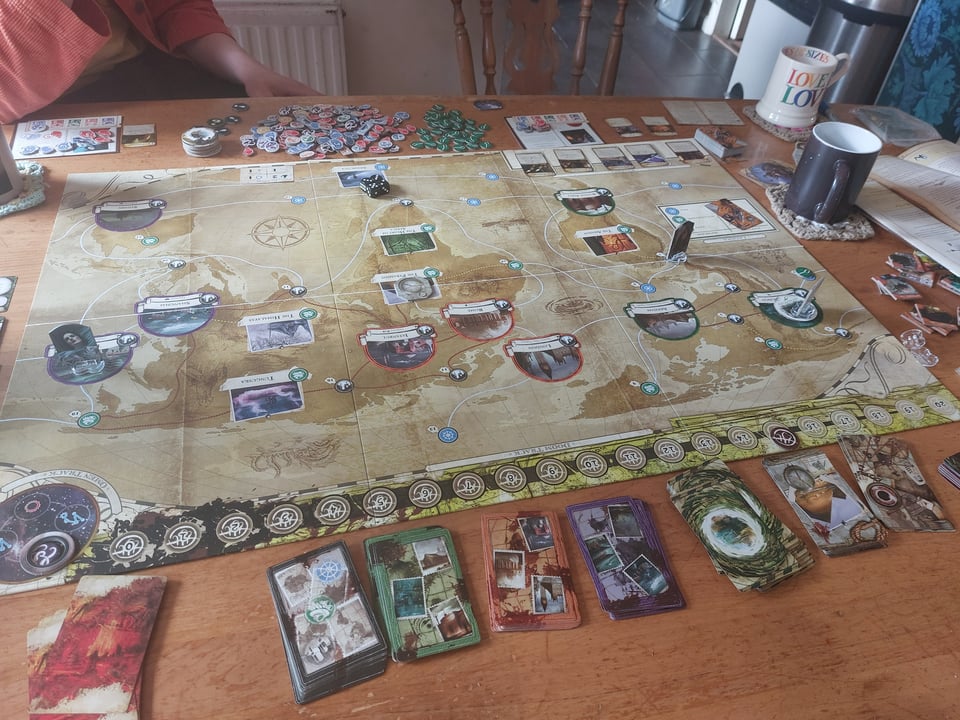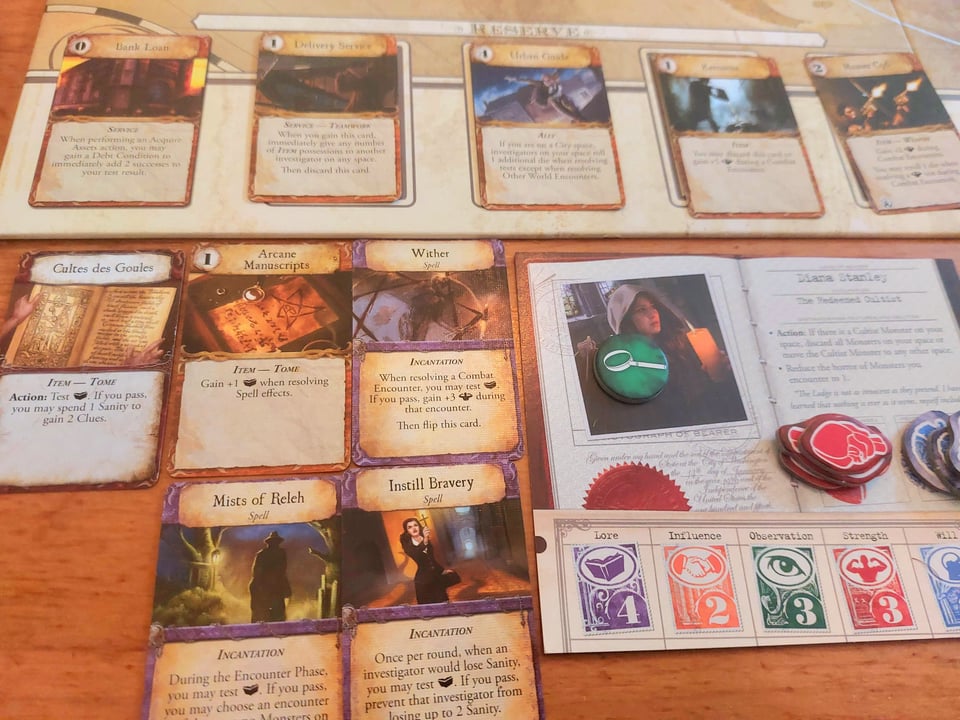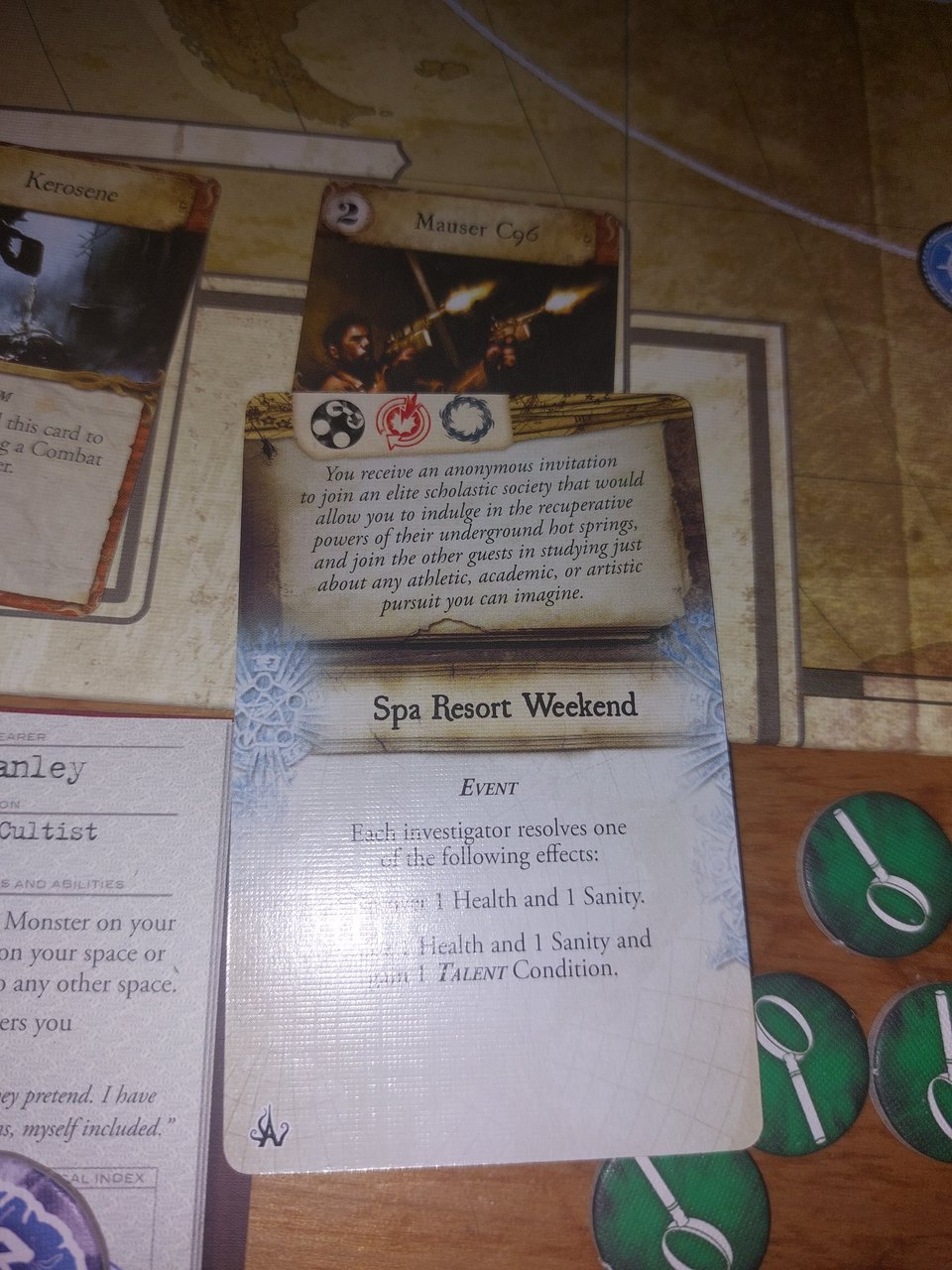My big lovely box of horror
Eldritch horror is a terrible, messy joy.
In my last post about games, I talked with relish about something new, tiny and smart. Today I want to talk about something old, big and dumb1.

Eldritch Horror is cooperative game which challenges 1-82 players to dash around the world, attempting to solve 3 mysteries before an ancient one, a being of imaginable power and unfathomable evil, wakes up and (probably) squashes them.
The mysteries take the form of particular tasks (collecting clues, for example) and form the main objective of the team. There are many other distractions however, including gates to other worlds which spawn monsters and will speed the arrival of the big bad. Rumours of further disturbance will need to be investigated, and all the while there is the opportunity to upgrade your abilities and equipment at the expense of game actions.

Mechanically, the game has a lot in common with its predecessor Pandemic. Each investigator has 2 actions which involve a combination of moving, preparing for future movements, resting, trading, and encountering various features of the current location. Tonally though Eldridge horror is a very different beast. Because Eldridge horror is funny. Very funny.
This might be a surprise because it is based on the world of the famously humourless (and racist) author HP Lovecraft. And Lovecraft’s world is intact- your protagonists are a pleasingly diverse collection of 1930s adventure tropes, and the monsters are ghoulish and terrifying. But not only has the prejudice been bled from Lovecraft’s work but so has his pessimism. Whereas in the original works an encounter with an ancient one would invariably result in death or madness, in this game, the minions at least can be despatched with a Mauser, a book of spells, and a roll of the dice.
Dice are a big source of the humour and joy of this game. Most encounters consisted in a number of "tests"- dice rolls against your investigator’s prowess in a particular area. The success or failure of these, either against the odds or having tipped them in your favour, produces many of the games most joyous moments. There is a great combination of randomness with the ability to mitigate through bonuses and re-rolls, that has subsequently been influential and led to some quite turgid dice-rolling experiences3, but here feels fresh and enormously fun.
The other real source of humour are the cards. There are no real jokes4- but there is a lot of text on the cards which gives you a kind of narrative hook for whatever it is you are doing at the time. Because of the kind of literature it’s pastiching, the games’s writing does not need to be particularly good or particularly coherent to work- you are just giving a flavour of a random, dangerous and exotic world. The humour often comes in with the double sided nature of many cards. You simply do not know what will happen when a "flip this card" affect is triggered and this is another moment of frequent hilarity as, for example, an investigator is summarily dispatched because they have made the wrong deal with the wrong people.
Your investigators are expendable and the game is brutal towards them. But the game is not brutally difficult, particularly compared to other cooperative games such as Ghost Stories or even Spirit Island. If you lose an investigator, you simply start the next turn with a new one, albeit not upgraded: but you can even go and loot the corpse of your fallen comrade for choice items, and even adopt their dog.
I love this game, as should be obvious. But it’s not perfect and I owe it to you, my elite squad of readers, to show you its flaws.
I have mentioned madness, and yes, the traditional approach to sanity versus insanity is very much in evidence here, where insanity is a direct consequence of psychic damage, comparable to death. Obviously, if you read insanity as a synonym for mental illness, this is pretty offensive, and perhaps I will return to this topic in a future post. On the other hand, I rationalise ‘sanity damage’ as suffering trauma, and the ‘insanity’ condition as being too traumatised to continue your work, which I think is a more comfortable reading. Whatever your views, I think it’s something to discuss when sitting down to play, especially with people you don’t know that well.
Eldritch is not particularly balanced. Some games are blood bath of dead and incapacitated investigators, others a rather pleasant procession for a well-equipped team. Success or failure can be very clear for a good half hour at the end of the game. But it’s such a ride, and the dice ensure that all is not ever completely lost, so I don’t worry too much about it.

A quick note: if you think ‘Ooh, a game for my 8-person game group’, I need to rein you in. Seasoned players have assured me that they won’t play this with more than 5- the downtime between turns and the chaos just gets too much. It plays well solo, it’s just not as funny or fun, in my book.
Finally, the game is long: There is no getting away from the fact that a play will usually last 3 hours, and this will make it an unsuitable purchase for a lot of people. But it is not terribly complex or particularly deeply strategic. Again, this may for some people be a turn off because, if they are going to play something for that long, they want it to be "crunchy". But if you want me to have a laugh, kill some monsters and be surprised and delighted for an evening, put me in front of Eldridge horror–I can think of nothing better.
(And it’s not especially pricey by modern standards)
Some of you might notice a slight change to this email- I have migrated to Buttondown, who have been amazing so far.
Yes I am aware that this describes me. Well done.
See below- don’t play this at 6-8. Please.
Maybe it’s harsh to single out any particular game, but Dice Theme Park springs to mind.
Jokes on cards or in game flavour text are universally awful, so this is a mercy.